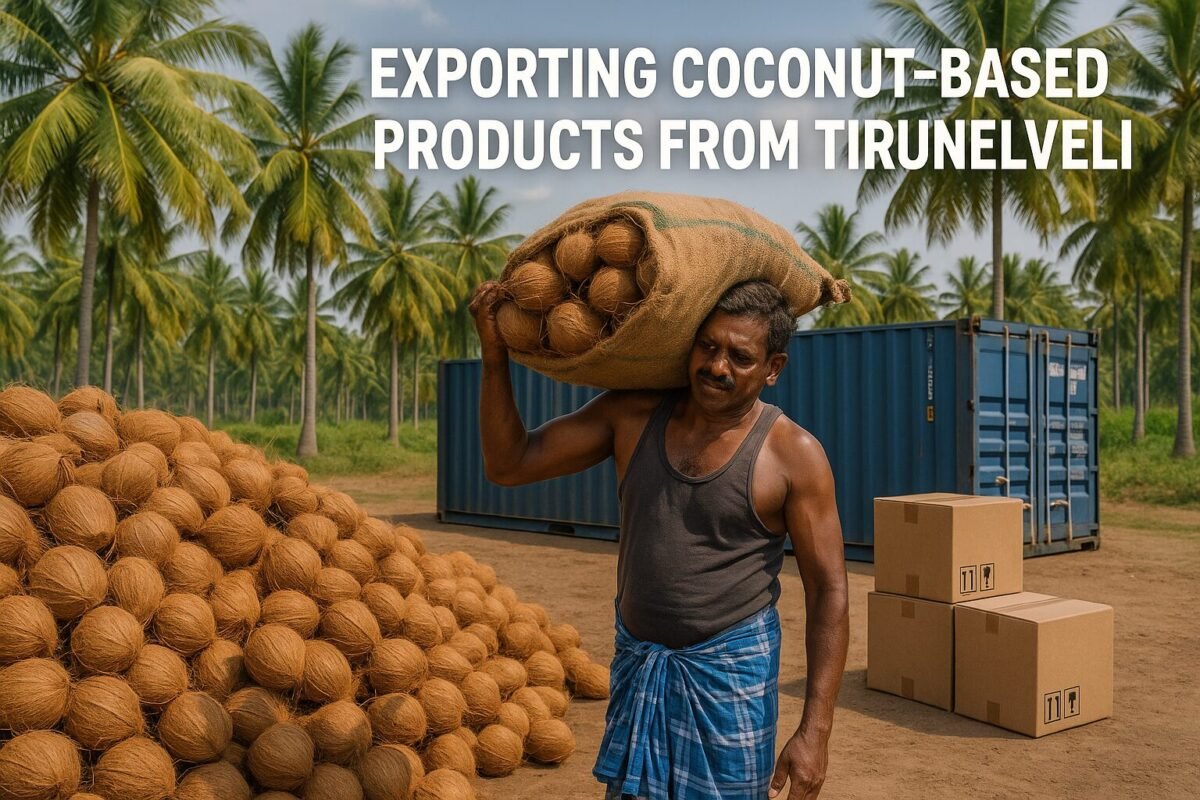
Exporting Coconut-Based Products from Tirunelveli
Tirunelveli, a vibrant district in southern Tamil Nadu, is fast becoming a hotspot for exporting coconut-based products from Tirunelveli to markets across the world. With its rich coconut farmlands, skilled farmers, and supportive infrastructure, this region is steadily stepping onto the global trade stage. The market for natural coconut products—like oil, coir, desiccated flakes, and even coconut water—is booming. And in this rising wave, exporting coconut-based products from Tirunelveli has become a game-changer for the local economy.
Why Tirunelveli is Coconut Country
Coconuts are everywhere in Tirunelveli. Thanks to the region’s warm climate, well-irrigated land, and generations of farming knowledge, the soil here naturally supports coconut cultivation. Farmers here don’t just grow coconuts—they live by them. From harvesting to processing, most families in coconut-growing villages have made this tree a central part of their life and livelihood.
What sets these coconuts apart? Their quality. Coconuts from Tirunelveli have high oil content, solid shells, and great taste. That’s exactly what international buyers look for.
The Coconut Products That Are Winning Global Markets
Let’s break down the major coconut-based exports from this region:
- Virgin Coconut Oil – Used for cooking, skincare, and haircare.
- Coconut Water – A natural, healthy drink packed in bottles or tetra packs.
- Desiccated Coconut – Dried and grated, perfect for baking and snacks.
- Coconut Shell Charcoal – Used for grilling, filtration, and eco-fuel.
- Coir and Coir Mats – A biodegradable alternative to synthetic fiber.
- Coconut Milk and Cream – Popular in vegan cooking and desserts.
Each of these products is processed and packed with care to meet international food safety and export standards.
From Farm to Container Ship: How Exporting Happens
The export process is more organized now than ever. Here’s how it works:
- Processing: Modern facilities process them into oil, powder, coir, etc.
- Harvesting: Coconuts are picked when they’re fully mature.
- Packaging: Products are hygienically packed and labeled for exports.
- Shipping: Goods are sent to Chennai or Tuticorin ports, both close to Tirunelveli.
Local entrepreneurs and cooperatives handle this entire flow. Many even export under their own brand names today.
Who’s Buying Tirunelveli’s Coconuts?
A lot of countries are interested. Key buyers include:
- USA – Especially for coconut oil and desiccated coconut.
- UAE and Middle East – For coconut water and snacks.
- UK and Germany – For coir, mats, and eco-friendly packaging.
- Japan and South Korea – For beauty and wellness products using coconut.
The demand keeps growing, especially with the global shift toward plant-based, natural, and organic lifestyles.
How This Impacts Local Lives
This rise in exports has changed lives across Tirunelveli. Farmers are now getting better prices. Young entrepreneurs are starting export businesses. Women’s self-help groups are running coir units and packing centers.
For instance, a small coir unit in Ambasamudram now exports doormats to Europe every month. Another group of farmers in Valliyoor began exporting virgin coconut oil under their own brand.
This is not just about trade—it’s about transformation.
What’s Helping the Growth?
Several factors are driving this boom:
- Proximity to major ports (Chennai and Tuticorin)
- Government support through subsidies and export training
- Schemes from Coconut Development Board (CDB)
- High global demand for sustainable, natural products
- Availability of trained labor and skilled coconut farmers
All these make Tirunelveli a smart place for coconut-based exports.
What Are the Challenges?
Like any trade, exporting coconut products has some challenges:
- Price fluctuations in the international market
- Strict regulations and certification requirements
- Access to capital for setting up processing units
- Maintaining consistent quality in bulk orders
However, with training, tech, and government help, local businesses are slowly overcoming these hurdles.
Real Stories from Tirunelveli
Meet Kannan, a second-generation farmer from Tenkasi. He used to sell coconuts locally for daily income. Today, with the help of a local NGO and training in export processes, his coconut oil brand is available in Malaysia. His income has tripled—and he’s hired 8 people from his village.
Or take Meena, who runs a coir rope unit with her sisters. Their products are eco-friendly and now exported to Germany every quarter. It’s a small business with a big dream—and Tirunelveli made it possible.
What’s Next for Coconut Exporters?
The future looks bright. Demand is growing every year. Countries are ditching chemical-based products in favor of plant-based ones. And coconut-based items are at the heart of this trend.
Tirunelveli is now getting attention not just from buyers, but also investors and trade bodies. New processing units are being planned. More brands are launching. Exporters are tapping into e-commerce platforms too.
All of this points to one thing—Tirunelveli is on the global map when it comes to quality coconut exports.
Conclusion: Why Tirunelveli Holds the Edge
It’s no longer just about local farming. Today, exporting coconut-based products from Tirunelveli is a global opportunity. With every shipment that leaves from this land, Tirunelveli is exporting more than products—it’s sharing purity, sustainability, and skill with the world.
The region’s mix of natural advantages, skilled hands, and growing infrastructure makes it a smart choice for long-term coconut exports. So whether it’s virgin oil, coir mats, or coconut water, there’s no doubt that exporting coconut-based products from Tirunelveli is here to stay—and grow.









